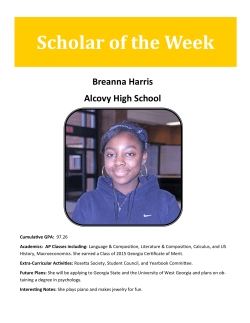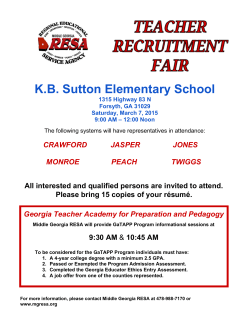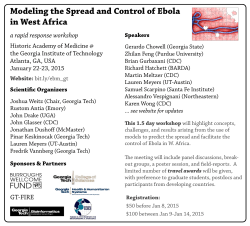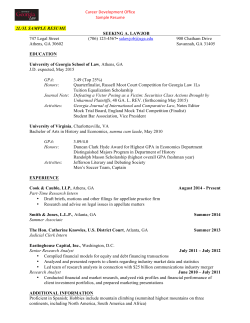
Sources 2015 program - Alonzo A. Crim Center for Urban
Reconstructing the Narrative: Stories of Change, Equity, and Promise in Urban Education May 2, 2015 Georgia State University Student Center 44 Courtland St., Atlanta Welcome from Dr. Brian Williams It is my honor and pleasure to welcome you to the 10th Annual Sources of Urban Educational Excellence Conference. In 2005, Dr. Asa Hilliard, III (Nana Baffour Amankwatia II) and Dr. Susan Crim-McClendon imagined a gathering of Dr. Crim’s Community of Believers that would challenge contemporary ideas of scholarship, research and knowledge. Ten years later, the Sources Conference continues to be a space for the sharing of innovative ideas, invaluable scholarship and lessons learned from work in our schools and communities in the southeastern United States. This year’s conference theme, “Reconstructing the Narrative: Stories of Change, Equity, and Promise in Urban Education,” is a call to our community to redefine the ways that we talk about urban schools and community and reconsider the ways that our collective stories inspire excellence in urban education. Many of you may remember that this theme also framed the powerful words of Dr. Jeannie Oakes during the 26th annual Benjamin E. Mays Lecture. In both cases, the theme serves as a reminder of the critical realization that excellence in urban education is more than a possibility; it is a goal which requires the resources of an entire community organized around a common vision. There are numerous examples of educators, schools and communities that provide children and youth with equitable access to a high quality and relevant education. The Sources Conference is a space to learn about and celebrate these accomplishments. This year’s conference promises to be our most exciting and rewarding one yet. More than 100 teachers, administrators, students, educational advocates and community leaders are traveling from across the U.S. to share their ideas, solutions and innovations. The topics of the presentations range from the equity in STEM (science, technology, engineering and mathematics) and the education of children from refugee communities to the cultivation of socially responsible school-university-business partnerships. This year’s conference has been organized by a collection of Georgia State faculty, students and staff in conjunction with individuals from communities and schools from across metro Atlanta. They have worked tirelessly for the past year to create this year’s program. Similar to education, the Sources Conference is successful because of the people who participate in it. Thank you for your contributions to today’s celebration. I hope that you will continue to work with the Alonzo A. Crim Center for Urban Educational Excellence and our partners as we seek to sustain the traditions that serve to advance excellence in urban education. Dr. Brian Williams Director, Alonzo A. Crim Center for Urban Educational Excellence Clinical Associate Professor, Department of Early Childhood Education Conference Agenda 8-8:30 a.m. Registration and Continental Breakfast 8:30-9 a.m. Opening Plenary 9:15-11:30 a.m. Morning Workshops (pre-registration required) 9:15-10:15 a.m. Concurrent Sessions - Block A 10:30-11:30 a.m. Concurrent Sessions - Block B 11:30 a.m. – 12:20 p.m. Lunch Break and Lunch and Learns (See schedule for Lunch and Learn details) 12:30-12:40 p.m. Special Presentation: AMPlify at Ivy Preparatory Academy Kirkwood Atlanta Music Project Aisha Bowden, Co-Founder and Director, AMPlify 12:45-1:45 p.m. Keynote Address Dr. Camara Jones, Morehouse School of Medicine 2-4:15 p.m. Afternoon Workshops (pre-registration required) 2-3 p.m. Concurrent Sessions - Block C 3:15-4:15 p.m. Concurrent Sessions - Block D 4:30-5 p.m. Closing About the Keynote Speaker Camara Phyllis Jones is a senior fellow at the Morehouse School of Medicine’s Satcher Health Leadership Institute and president-elect of the American Public Health Association. Previously, she was an assistant professor at the Harvard School of Public Health from 1994 to 2000 and a medical officer at the Centers for Disease Control and Prevention from 2000 to 2014. She received her B.A. in Molecular Biology from Wellesley College, her M.D. from the Stanford University School of Medicine, and both her Master of Public Health and her Ph.D. in Epidemiology from the Johns Hopkins School of Hygiene and Public Health. She also completed residency training in both general preventive medicine (Johns Hopkins School of Hygiene and Public Health) and family practice (residency program in social medicine at Montefiore Hospital). Dr. Jones is a family physician and epidemiologist whose work focuses on the impacts of racism on the health and well-being of the nation. She seeks to broaden the national health debate to include not only universal access to high quality health care, but also attention to the social determinants of health and equity, such as poverty and racism. As a methodologist, she has developed new methods for comparing full distributions of data, rather than simply comparing means or proportions, in order to investigate population-level risk factors and propose population-level interventions. As a social epidemiologist, her work on race-associated differences in health outcomes goes beyond documenting those differences to vigorously investigating the structural causes of the differences. As a teacher, her allegories on race and racism illuminate topics that are otherwise difficult for many Americans to understand or discuss. She hopes through her work to initiate a national conversation on racism that will eventually lead to a national campaign against racism. Selected Publications Jones, C.P. (2000). “Levels of Racism: A theoretic framework and a Gardener's Tale.” American Journal of Public Health; 90(8):1212-1215. Jones, C.P. et al. (2009). “Addressing social determinants of children's health: A Cliff Analogy.” Journal of Health Care for the Poor and Underserved; 20(4)Suppl:1-12. Jones, C.P. (2014). “Systems of power, axes of inequity: Parallels, intersections, braiding the strands.” Medical Care; 52:S71-S75. Conference Schedule 8:30-9 a.m. Opening Plenary Speakers Auditorium 9:15-11:30 a.m. Morning Workshops (pre-registration required) W W Full STEAM Ahead: Reinvigorating Booker T. Washington Cluster Schools and Communities - Court Salon Sheri Davis-Faulkner,Westside Communities Alliance, Georgia Institute of Technology;Tangee Allen, Raising Expectations; Maria Armstrong, Raising Expectations; Roy Craft, Maker Faire Atlanta; and Christy Robinson,The Children’s School The Tiles for Social Justice Project: Using Art to Develop Creative and Critical Thinkers - House Salon Laura Meyers and Adrian Douglas II, Georgia State University; Rebecca Guzman, Christi Cleveland and Brittany White, Martin Luther King, Jr. Elementary School 9:15-10:15 a.m. Concurrent Sessions – Block A F15 Focus15: Civic Engagement and Social Justice - Speaker’s Auditorium Nursing Home Adoption: The Problem-Solution Project Connects Future Teachers, Urban Elementary School Students and the Elderly Monique Brooks, Danielle Cummings, John Edwards, Robyn Hobson, Dani Marshall,Treasure Robinson and Jenaye Wilson, Georgia State University Hello, Edmodo: Using an Online Platform with Elementary Students to Critically Investigate Literature/Historical Texts April Poindexter, Georgia State University Tweeting as Civic Agency: The Role of Social Media in Social Studies Methods Courses Nakeshia Williams, Erik Byker and Amy Good, University of North Carolina, Charlotte Presentation Key W Workshop: 2 hour, 15 minute interactive learning session (pre-registration required) F15 Focus15: 15-minute focused presentation on a specific topic F45 Focus45: 45-minute focused presentation on a specific topic P CWC Panel: Series of related presentations by a group of individuals about a specific topic Conversations with Community: 1-hour facilitated dialogue with session participants about a specific topic Conference Schedule P P P F45 Dismantling the Narrative: Urban Black Youth Use Multimedia for Civic Engagement Lanier Suite Shadonna Davis, Garfield Bright, Emerson Dudley, Deshawn Fleming and Tobias Lee, Georgia State University; Kidane Myers, Homeschool How a Learning Network in the Maynard-Jackson Cluster can Elevate Teaching and Learning - Sinclair Suite Robert Ryshke,The Westminster Schools/Drew Charter School; Don Doran and Nicole Tuttle, Drew Charter School; Rondalyn Pickney, Rollins Center; Nicole Jones,Toomer Elementary School; and David White, Atlanta Public Schools The Perfect Storm of High-Stakes Education Reform: Fight or Flight - Golden Key Sheryl Croft, Kennesaw State University; Mari Roberts, Clayton State University; and Vera Stenhouse, Georgia NAME Focus45: Equity, Innovation and Change Wearable Technologies: Mobilizing girls into the world of STE(A)M - Senate Salon Tiffany Ray, Generation Infocus Stay in your box…whatever you do, don’t come out of the box! - Lucerne Suite Nedra Bolder, Imaginarium Child Development Company CWC The Center for Urban Language Teaching and Research (CULTR): Global language access for all - Capital Suite William J. Nichols, Patricia Nolde, Mary Schoffner and Sara Weigle, Georgia State University 10:30-11:30 a.m. Concurrent Sessions – Block B F15 Focus15: Black Girls, Black Women, Equity and Innovation - Speaker’s Auditorium Black Girl Speak: Negotiating Television Media Messages Nakeshia Williams, Bettie R. Butler and Azure Covington, University of North Carolina, Charlotte Literacy, Advocacy and Activism: Black Muslim Girls Reading and Writing for Social Change Gholnecsar E. Muhammad, Georgia State University Revisiting the Double Bind: Ensuring the Development and Advancement of Women of Color in STEM Brittany J. Harris, Georgetown University F15 Focus15: Lifelong Learning as Change - Lanier Suite Common Core and the Discourse of “High Expectations:” Implications for Urban Education Morgan Anderson, Georgia State University Conference Schedule Evaluation of the Preschool Life Skills Project in an Urban Preschool Setting Gracie Allen Beavers, Georgia State University Service Learning in African American Studies: A Model for Teaching Students How to Become Agents of Change Patricia Dixon, Georgia State University P Courage and Conscience: Positioning Young Learners as Thought Leaders - Golden Key Social Inspiration in a Pre-K Classroom Lindsey Harrelson, Georgia State University Empowering Kids to Find and Use Their Voices Within Various Community Settings Katherine Robertson, Georgia State University Creating Leaders From English Language Learners Sanidia Oliver, Georgia State University Composting At School: Students Establish an Effective Composting Program for Their Elementary School Christian Young, Georgia State University and The Lovett School P F45 Our Stories, Our Struggles:Voices of Resistance from New Orleans - Sinclair Suite Elizabeth K. Jeffers, Georgia State University; Gentry Allen, New Orleans educator; Ruth Idakula, Community Education Project of New Orleans; Frank Buckley, Nikkisha Napolean and Debra Jones, Concerned Citizens of New Orleans Focus45: Equity Through Collaboration Creating Dialogue Spaces with Urban Children - Senate Salon Ewa McGrail, Gertrude Tinker-Sachs and Megan Lewis, Georgia State University Equity, Human Development and Urban Communities: Reviewing Research and Practice Lucerne Suite E. Namisi Chilungu, DesMonet Cooper, Mohammad Harb, Emily Huffman, Julie Kim,Tre Landry, Joanna Lee, Ryan Martin, Zach Salling, Devrick Thomas and An Vu, Georgia State University CWC CREATE-ing Opportunities for Collaboration within and across schools: Examination of an innovative teacher induction program - Capital Suite Elizabeth Hearn, Atlanta Neighborhood Charter School; Keisha Hancock,Wesley International Academy; Stephanie Behm Cross and Susan Cannon, Georgia State University Conference Schedule 11:30 a.m.-12:20 p.m. Lunch and Learn Concurrent Sessions Healthy Heart Coalition Experiential Learning Tent: Enjoy a Smoothie, and Hands-On Activities! - Hallway outside of the Student Center Ballroom Cornelia King, Health Promotion Action Coalitions “Agents of Change:” Servant Leaders Teaching One Generation How to Help Another - Golden Key Ryan Z. Maltese, Joseph & Evelyn Lowery Institute for Justice & Human Rights 2-4:15 p.m. Afternoon Workshops (pre-registration required) W A Framework for Starting Conversations Around Change: A Tool for Urban Educators House Salon Meggan Levitt and Sandy Simpson, Georgia Institute of Technology W Owning the Narrative: Liberating Ourselves Through Critical Literacy and Action Research in the Carceral System - Senate Salon Mosi Makori, Nathan Cummings Foundation W A Drama-Based Workshop with the Alliance Theatre: Sharing and Creating Stories of Social Justice - Speakers Auditorium Michele Mummert, Alliance Theatre 2-3 p.m. Concurrent Sessions – Block C F15 Focus15: Language, Culture and Equity - Lanier Suite Code-meshing: A Review of the Literature to Encourage Dialect Diversity in the Classroom Clarice Thomas, Georgia State University Implementing Cultural Responsive Instruction in an Urban Education Setting Sabeen Bhimani, Georgia State University Student Response to Language Variations: Texts Rich in AAVE and British English Kathleen Zackery and Nicole Dukes, Georgia State University Excluded Voices: An Introduction to Cultural Violence in Education Okera Nsombi, South Carolina State University Conference Schedule P Building Communities of Hope in Urban Contexts - Golden Key “Black Lives Matter:” Examining the Lives of Martin, Brown, Garner and our students Zuqorah Williamson, Georgia State University Future Leaders Deserve Fantastic Facilities: Student Restroom Beautification Initiative Kyla Gaines, Georgia State University To Play or Not to Play?: Students Seeking a More Friendly Playground Sharaykia Stanford, Georgia State University The Impact of Building Classroom Community on Student’s Academic Performance Tilifayea L. Griffin, Georgia State University and The Lovett School P F45 Westside Community-Based Collaborative: A New Approach for Diverting Youth from Crime - Sinclair Suite Shadonna Davis, Georgia State University Focus45: Partnering for Change The Way Forward: Reimagining Public-Private Partnerships for 21st Century Global Workforce Development - Lucerne Suite Marlene MacLeish and James W. Lillard, Morehouse School of Medicine; Milton C. Clipper Jr., Public Broadcasting Atlanta; Raymond O. MacLeish and Cristian A. Mercado,The City College of New York; and Michael O. Molina, Clarkston Community Center The Problem-Solution Project: Fostering Promise Through Empowering Urban Elementary School Students - Court Salon Kathryn Becket, Quynh Le, Lauren Jones, Shani Cooper, Shiela Payton, Christal Warren, Mikaela Wilson, Mindy Cho, Ashley Beauford, Levonne Gigger, Daniele Xenos, Courtney Mack, Lanyisha Smallwood,Tiffany Pitts, Jane Lai, Rebecca Jones, Esther Lee, LaShae Rhodes,Tonya Merl, Dani Stephens, Kristen McMahan,Vance Allen, Christina Bronner, Alta Walker, and Keven Wilkinson, Georgia State University CWC Dialogues of Hope: Cultivating the Genius of Refugee and Immigrant Children in U.S. Communities - Capital Suite Rhina Fernandes Williams and Teresa Fisher-Ari, Georgia State University 3:15-4:15 p.m. Concurrent Sessions – Block D P Nurturing and Empowering Youth and New Teachers through Mentoring - Court Salon Vera Stenhouse and Sandy Matthews, Georgia State University; Nicole Tomlinson and Kurtis Greene, Fertile Ground NEYW, Inc. Conference Schedule P F45 Learning to Listen: The Clarkston Roving Listener Project as a Radical Pedagogical Experiment - Sinclair Suite C. Aiden Downey, Emory University Focus45: At the Intersection of Equity and Promise Exploring Promise through Educational Psychology Field Experiences - Lanier Suite E. Namisi Chilungu, Jessica Harden, Shakerra Henry,Tatianna Lee and Mauricio Taumaturgo de Oliveria, Georgia State University Education Equity with Common Core: Indicators for Success - Lucerne Suite Patrice Barlow, Saving Our Sons and Sisters International The Global Citizenship Project - Capital Suite Edgar Miranda,The International Community School CWC All the Little Children: Kindergarten Redshirting and the Implications of a Change in Georgia’s Elementary School Entry Age - Golden Key Rosalyn R.Washington, Georgia State University History of the Sources Conference Since 2005, the Sources of Urban Educational Excellence Conference has shaped discourse on the factors that define the social and academic experiences of children in urban communities and schools. The genesis of this conference was steeped in the affirmation of urban students and the teachers and their work to positively transform their own lives. From its inception, Sources has set out to share the reminder that brilliance in urban education is not unique and that the College of Education produces teachers and leaders who are experts in the cultivation of urban educational excellence. Dr. Asa Hilliard III (Nana Baffour Amankwatia II), former Georgia State University Fuller E. Callaway Professor of Urban Education, is the visionary behind the Sources Conference. It was always Dr. Hilliard’s desire to have public space to share ideas about the Afro-diasporic experience, the conditions of urban communities and best practices in serving urban children. In the winter of 2004, Dr. Hilliard expressed to Dr. Susan Crim-McClendon, the Crim Center’s associate director at the time, his interest in creating opportunities for students in the College of Education to present such work. Dr. Crim-McClendon supported that idea and immediately began reaching out across the Georgia State University campus and the Atlanta community to develop a conference that would highlight the work of urban education practitioners while also highlighting effective models of urban teaching and community building. In 2005, Dr. Susan Crim-McClendon gave life to Dr. Hilliard’s vision and the Sources Conference was born. The name of the Sources conference was derived from the journal used by students in the College of Education’s Urban Teacher Leadership program, where Dr. Hilliard served as a professor and mentor. The first Sources conference was held in the Georgia State University Student Center at the end of spring semester 2005. On that day, Dr. Hilliard served as the first Sources keynote speaker. The initial participants were students in the College of Education’s Urban Teacher Leadership master’s program and the Department of Early Childhood Education’s Urban Accelerated Certification and Master’s program. These students were already responsible for presenting “problem-solution” projects as an academic requirement. The Sources Conference provided them with a platform to present their ideas at a conference. Professors and other students also attended the conference, providing support for presenters and establishing a safe space to discuss the challenges and successes in urban education. The Sources conference connects all community members to the issue of quality education as a human right. What once started as a small conference highlighting the work of students in two College of Education master’s degree programs has now developed into the premier urban education conference in the Southeast. It has become a place for students, teachers, religious leaders, non-profits, lawmakers and other community members to present their work and learn best practices for enhancing education in urban schools and communities. Today, 10 years after the first Sources Conference, narratives on public education are becoming narrower and less complex as popular media, research, and reform efforts define urban schools and communities as inadequate, deficient and underperforming; places to escape from as opposed to sources of excellence. At the 10th Annual Sources of Urban Educational Excellence Conference, we intend to reconstruct this narrative by highlighting stories of change, equity and promise in urban education. The state of a community’s children is a reflection of the state of that community. Today, we pose the question, “How are our children?” In 2015, it is still important to examine the social issues impacting education while keeping children central to the conversation. In the years to come, the Alonzo A. Crim Center for Urban Educational Excellence looks forward to continuing to work with the community to reframe the narrative of urban education. We will continue to gather with community members to develop solutions that support and nurture the genius of our children. The Alonzo A. Crim Center would like to thank Dr.Vera Stenhouse, Dr. Olga Jarrett and Dr. Susan Crim McClendon for contributing to the historical narrative of the Sources of Urban Educational Excellence Conference. We would also like to thank Georgia State University, the College of Education and the countless volunteers, students, teachers, professors and community leaders who have supported this work for the past 10 years. About the Alonzo A. Crim Center for Urban Educational Excellence “Come In. Get Connected. Do the Work.” Children and families in urban communities throughout the United States are currently being underserved by the public school system and are consequently limited in their ability to achieve the goals they have set for themselves, their families and their communities. The Alonzo A. Crim Center for Urban Educational Excellence was established in 1996 by Dr. Lisa Delpit to provide a “city-wide laboratory for the development of excellence in urban education.” Since its inception, the center has served the southeast region of the nation as an interdisciplinary outreach, research, and educational support and development hub aimed at continuing the legacy of Dr. Alonzo A. Crim. It is the mission of the Alonzo A. Crim Center for Urban Educational Excellence to extend Dr. Crim’s vision by optimizing the life opportunities of children and families in urban communities by ensuring the availability of a prosperous and equitable school environment. We believe that through our work we can create a world where all children have equal access to educational opportunities that prepare them to be academically excellent, culturally competent and critically conscious. Outreach The Alonzo A. Crim Center for Urban Educational Excellence implements programming aimed at creating pathways to success for individuals served by urban schools and communities. Our outreach programs include: the Atlanta Housing Authority’s Good Neighbor Program, the African American Male Initiative, the Early College Program, Girls Who Code, I.C. M.E, Jumpstart, and Technology, Environment and Mathematics (TEAM) AmeriCorps. The center also provides program incubation opportunities to community members interested in developing effective community outreach initiatives. Research The center generates research, policy briefs and white papers aimed at deepening the community’s understanding of the practices, systems, and structures that nurture urban educational excellence. We foster an environment where doctoral students and affiliated faculty conduct and disseminate research related to key issues in urban education. Our research groups, programming, and conferences include: the Urban Education Think Tank, the Power of Students Event, the Annual Sources of Urban Educational Excellence Conference and the Annual Benjamin E. Mays Lecture Series. Educational Support and Development Developing the skills of key community stakeholders who support urban education is a priority of the Alonzo A. Crim Center for Urban Educational Excellence. The center creates opportunities to connect with resources, organizations and individuals that can support and further advances in urban education. We also provide individuals with the knowledge and skills needed to support, develop and implement effective solutions for urban education. Special Thanks The Crim Center would like to thank the members of this year’s organizing committee for their contributions to 10th Annual Sources of Urban Educational Excellence Conference. Georgia State University Committee Members Community Committee Members Angela Turk Anique Hameed Anthony Outler Brian Williams Carmen Cunningham Chike Akua Claire Miller Crystal Bradley Dana Salter David Brown Elijah Porter Erica Edwards Garfield Bright Janice Fournillier Jason Moore Cornelia King Healthy Heart Coalition Kweku Vassall LaToya Russell Laura Meyers Lynda Lee Osborne Maima Chea Nancy Schafer NiShona Curry Olga Jarrett Rhina Williams Shadonna Davis Shaila Philpot Tene Davis Teri Fisher Tim Merritt Winnie Chan Jean Walker Jillian Ford Kennesaw State University Mari Roberts Clayton State University Mila Seals Mercer University Shekema Silveri Silveri Service Learning Academy Susan McClendon Woodson Elementary School Vera Stenhouse Special Thanks Special thanks to Jonathan Gayles, Celeste McNeil, and Michael Molina for their contributions to this year’s Sources Pre-Conference Programs; the management of Sidebar and all of the local artists who shared their gifts and energy at SideNote II; the volunteers who worked diligently to support today’s conference; Camara Jones for bringing our keynote address; Direct Focus Youth and Danielle Wilcox for the #Sources2015 campaign videos; and College of Education Dean Paul Alberto and Associate Dean Gwendolyn Benson for their ongoing support of the Crim Center and the Sources Conference. The work of the Alonzo A. Crim Center for Urban Educational Excellence is made possible by: Alonzo A. Crim Center for Urban Educational Excellence College of Education at Georgia State University 30 Pryor Street, Suite 350 Atlanta, Georgia 30303 Office: 404-413-8070 Facebook facebook.com/CrimCenter Twitter @AlonzoACrimCUEE Instagram @AlonzoACrimCUEE Website crim.education.gsu.edu Help us keep the Sources Conference free: bit.ly/Give2Crim
© Copyright 2025









